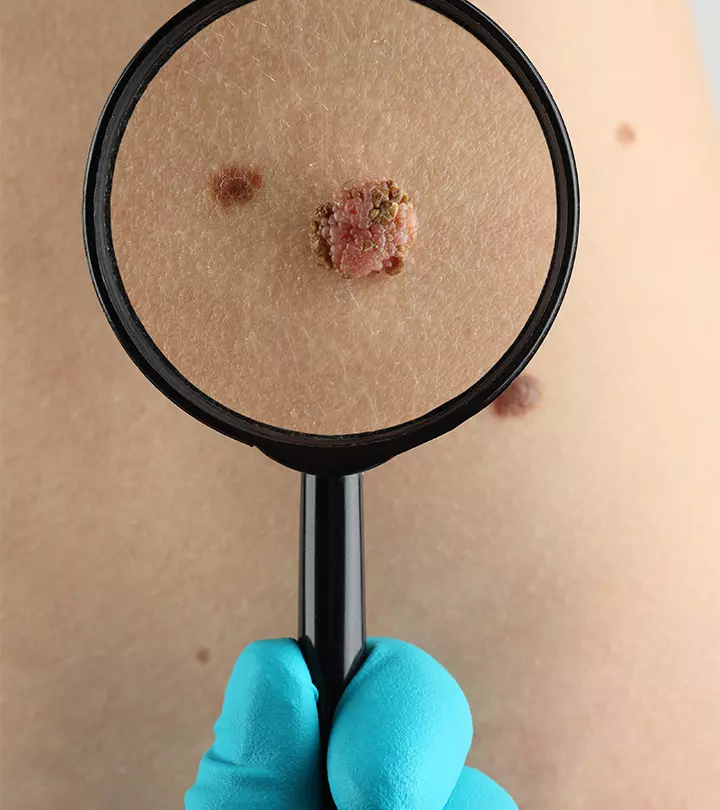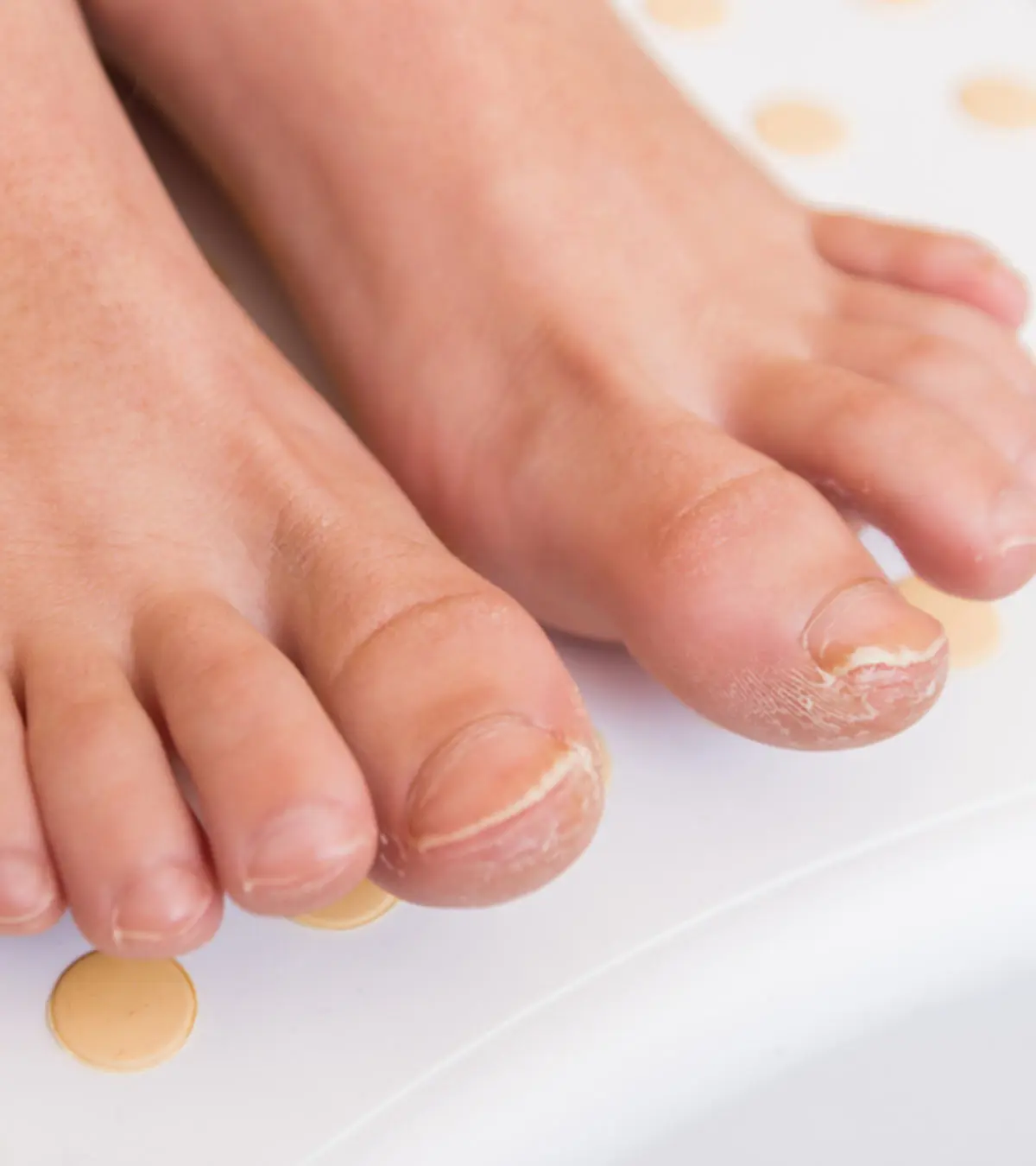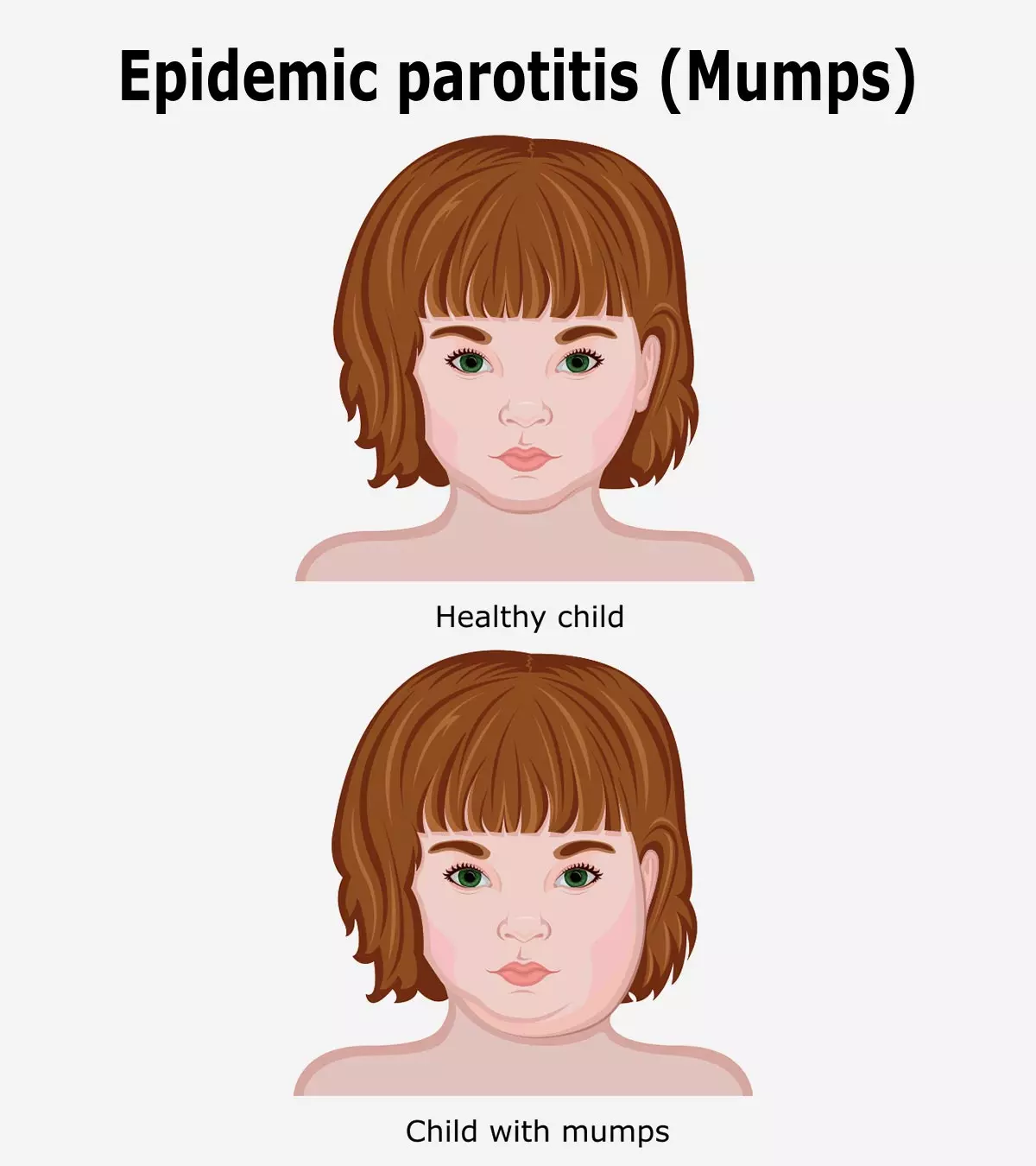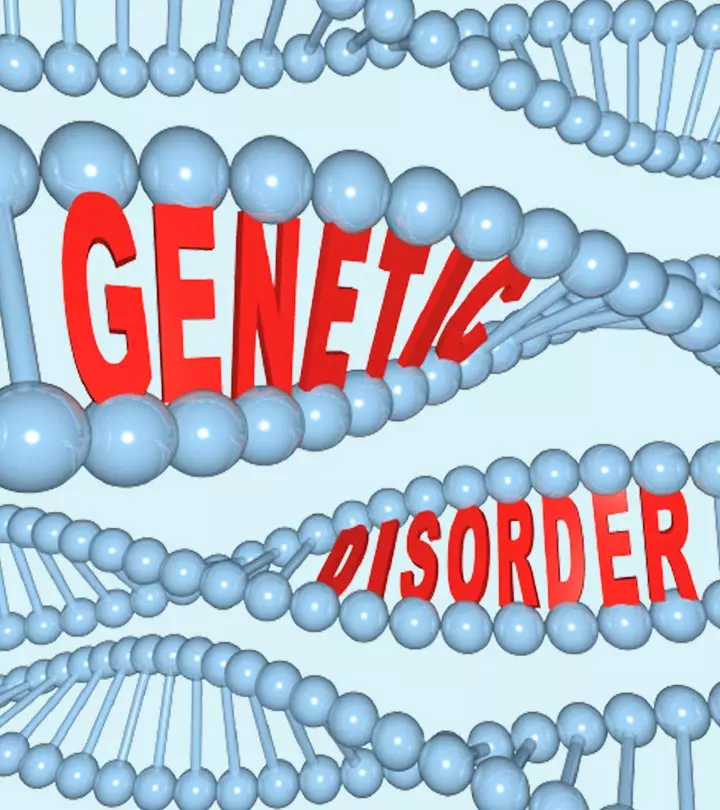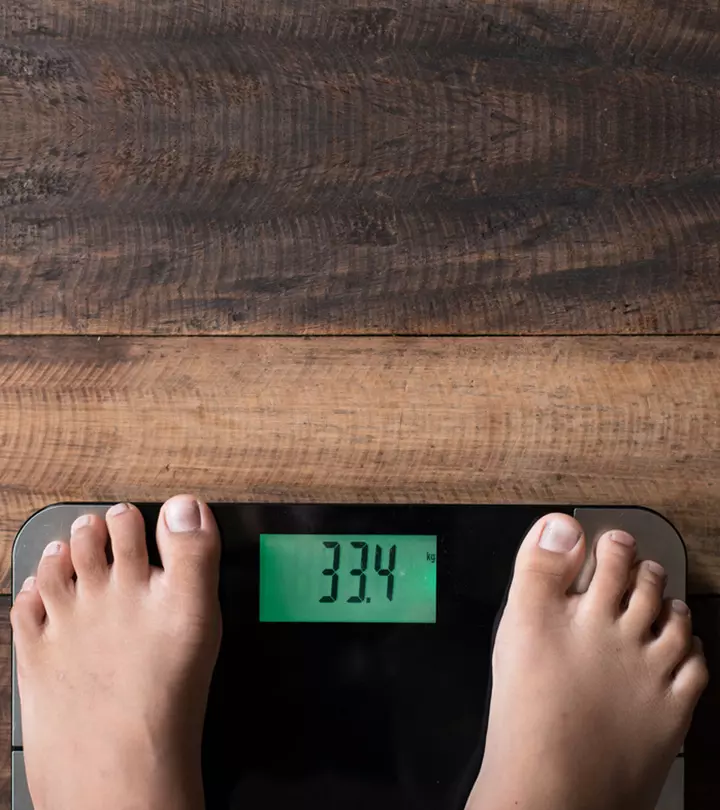
Image: Shutterstock
Weight gain in kids is an important part of their development. A child is considered underweight if their BMI is below the fifth percentile when their weight is compared to their height. Being underweight during childhood might hinder their development rates. Thus, it is important to ensure that they get enough nutrients for their growth and development per their age (1). Various reasons might cause a child to be underweight. Hence, it is important to identify the root cause and modify their nutrition intake and diet accordingly.

Read on to know the possible causes of your child being underweight and how to help them gain weight.
Key Pointers
- Decreased daily calorie intake, food allergies, and eating disorders are common reasons that render children underweight.
- Being underweight can result in delayed development and decreased cognitive ability.
- Below are some recommendations for preventing children from missing meals, providing them with a balanced diet, and managing your child’s weight issues.
Why Is A Child Underweight?
A child may be underweight either due to an underlying health issue or other factors that impede the child’s daily intake of calories. These reasons may include the following (2) (3).
- Less daily calorie intake due to general disinterest in eating
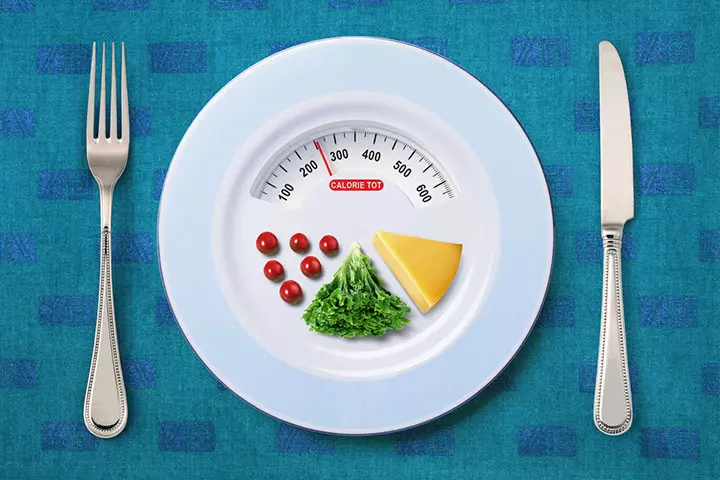
- Insufficient calories for the body due to increased physical activity
- Parent’s lack of knowledge of the child’s daily calorie requirement
- Diluted supplement preparations in case the child is on supplements
- Underlying eating disorders such as anorexia nervosaiAn eating disorder characterized by extreme weight loss and an intense fear of gaining weight
- Inability to swallow due to neurological or oral sensitivity issues
- Metabolic disorders that affect the conversion of food into energy such as galactosemiaiA genetic disorder that prevents the breaking down of galactose sugar, causing an excess amount that can impact the health or phenylketonuriaiA genetic disorder that leads to an increase in the levels of amino acids (phenylalanine) in the blood
- Malabsorption due to diseases such as cystic fibrosisiA genetic disorder affecting the lungs, pancreas, and digestive system by blocking the airways and organ ducts with mucus , Crohn's diseaseiA chronic inflammatory and autoimmune condition of the digestive system characterized by pain, diarrhea, and fatigue , or celiac diseaseiA reaction caused due to the intake of gluten (the protein found in wheat and some other grains)
- Food allergies or intolerances that cause gastrointestinal disturbances
- Childhood stress and trauma leading to disinterest in food
- Chronic or recurring infections or diseases
 Quick fact
Quick factWhat Happens If A Child Doesn’t Gain Weight?

A child who struggles to keep up with the growth pattern as per their age could be diagnosed with failure to thrive (FTT). This diagnosis would be made by a healthcare provider. FTT can lead to (4):
- Short stature
- Decreased cognitive ability
- Physical inactivity
- Delayed development
- Behavioral issues
Children who are underweight may also have some other long-term implications, such as (9):
- Increased risk of infections
- Risk of recurrent infections
- Poor immunity
- Malnutrition
- Increased chances of developing osteoporosis
- Decreased muscle strength
- Hypothermia
How To Help A Child Gain Weight?
The ideal treatment to help a child gain weight depends on treating the underlying cause.
It’s best to involve a pediatric dietician in making changes to your child’s diet to improve weight gain. The following tips, including minute changes to their everyday food patterns, could be used alongside the treatment for better results (5) (6).
- Provide your child with a balanced diet. Limit fatty foods, sugary beverages, and fast food consumption.
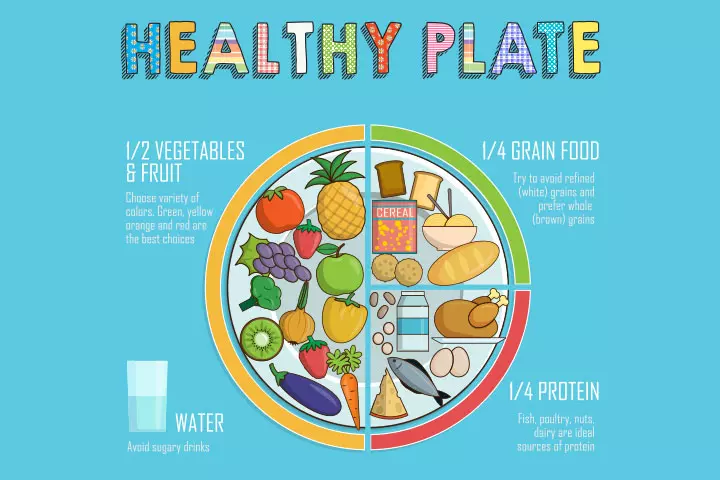
- Base their meals on complex carbohydrate-rich foods such as potatoes, pasta, bread, or rice.
- Prevent them from skipping their meals.
- Avoid making the meals bulky as it may lead to overeating. Six to eight small meals or snacks per day might be more suitable considering a child’s appetite.
- Mix milk in pasta or soups to increase caloric content.
- Encourage healthy protein-filled foods during their snack times, such as trail mix or nuts.
- Substitute low-fat milk with whole milk or whole-milk yogurt for excessive calorie intake.
- Add cheese to recipes wherever you can.

- Top-up fruits, pancakes, or waffles with heavy cream and dry fruits for some extra calories.
- Include a cheese dip on the side with vegetable salads.
- Provide them with fruit smoothies for kids, milkshakes, or whole nuts or nut butters, which are calorie-dense.
- Substitute oils with butter
- Use avocados and fresh fruits on toasts and sandwiches.
- Consider meats with healthy fat content.
 Point to consider
Point to considerYou may also provide the child with any supplements or protein powder for kids prescribed by a doctor for weight gain. Administering supplements to a child is not advised unless suggested by your healthcare provider or your dietitian (1) (7). A dietician could also help create a specialized diet plan with weight gain foods for kids to meet the right calorie requirement for your child’s age.
Besides these interventions, the following lifestyle changes could help a child eat food with interest and without any distractions, potentially improving the number of calories they consume.
- Eat meals together as a family
- Keep mobile screens away and TV off during meals
- Maintain a regular meal time
- Avoid low-nutrient, high-calorie foods such as junk food or soda/soft drinks
- Encourage healthy food habits such as eating a balanced diet
Healthy Weight Gain Recipes For Children
1. Chicken and pasta salad

You will need:
For pasta salad
- 1lb (2 cups) penne pasta or any similar pasta
- 1lb (2 cups) cooked and shredded boneless skinless chicken
- 3 sliced green onions
- 2 cups of tomatoes
- ½ cup shredded Parmesan cheese
- Finely chopped basil
- For dressing
- ½ cup olive oil
- ¼ cup lemon juice
- 2tsps honey
- 2 cloves of minced garlic
- Salt and pepper
- Finely chopped basil and shredded Parmesan cheese for garnishing
How to prepare:
1. Make the dressing by combining all the ingredients mentioned under the dressing list in a small bowl and beat until combined well.
2. Add the pasta to a pot of boiling salted water and let it cook for a certain time as per the package instructions.
3. Drain, rinse, and transfer the pasta to a bowl.
4. Add the cooked and shredded chicken, green onions, tomatoes, basil, and cheese to the pasta bowl and toss well.
5. Add the dressing to the pasta bowl and toss again.
6. Add salt and pepper to taste and garnish with basil and cheese.
7. Serve immediately to prevent sogging.
2. Weight gain smoothie

You will need:
- ½ cup of whole-fat coconut milk or cow milk
- 1 semi-ripe banana
- ½ avocado, ripe
- 1tbsp nut butter
- 1/4 cup of berries
- 1tsp of vanilla extract
How to prepare:
1. Cut the banana, avocado, and berries into small pieces and put them in a blender.
2. Add all other ingredients to the blender and turn it on at high speed.
3. Check the blender after a minute. Once the mixture is blended well and turns smooth, pour the smoothie into a cup or in a mason jar with a straw.
4. Serve it to your children directly or add some ice cubes if they prefer a cold smoothie.
Frequently Asked Questions
1. When should I worry about my child’s weight gain?
Parents must pay attention to their child’s weight and ensure they stay within a healthy weight range. A body mass index (BMI) less than the 5th percentile means the child is underweight, whereas a BMI at or above the 95th percentile means the child is obese, which can lead to various health problems, including childhood obesity. (8). While weighing too less can lower immunity and affect growth, being overweight or obese can expose a child to the risk of developing chronic health conditions such as diabetes and breathing problems (9) (10).
2. What medical conditions cause weight gain in children?
Genetic syndromes such as Prader-WilliiA disorder caused by an abnormality of chromosome 15 and characterized by poor growth and development, obesity, and short stature , leptin resistanceiA condition where the brain does not respond to the leptin hormone resulting in constant hunger and excessive food intake , insulinoma (excessive insulin production), Cushing syndromeiHormonal disorder caused by excessive amounts of cortisol, the stress hormone, in the blood , growth hormone deficiency, and hypothyroidism are some medical conditions that can cause obesity in children (11) (12).
3. How can I tell if my child is underweight?
Regular monitoring of a child’s height and weight and plotting of the data on the CDC’s growth chart can help you know if your child is underweight or not.
4. What impact can a poor diet have on a child’s nutritional needs?
A poor or unhealthy diet can’t meet your child’s nutritional needs. Besides, it can cause insufficiency, deficiency, or excess of nutrients, which can affect your child’s proper growth and development. Additionally, it can expose the child to several health issues due to weakened immunity (13).
5. How do genetics affect my child’s weight gain?
Genes can affect a child’s appetite, metabolism, food cravings, body-fat distribution, and even having to eat to cope with stress, contributing to obesity. A child is most likely to be obese due to genetic makeup, especially if they have been obese throughout their life, if both parents are obese, or if losing weight is a challenge even after changing diet and increasing physical activity (15).
Healthy weight gain for kids is essential for their adequate growth and development. If you notice the signs of weight loss, staggering growth, or an eating disorder in your child, consult a pediatrician, who may suggest you follow a diet chart to ensure the child receives adequate nutrients. Encourage physical activity and limit sedentary lifestyle habits such as excessive screen time. Under your pediatrician’s guidance, you can add more complex carbohydrates, whole milk, nuts, butter, and healthy proteins to their diet. Further, maintaining a weight gain reference chart can help parents track their child’s health and growth.
Infographic: Essential Tips To Help Children Gain Weight
Several conditions and factors can lead to insufficient weight gain in children, including poor calorie intake and metabolic disorders affecting nutrient absorption. Knowing some healthy eating and diet tips with nutritional requirements, as listed in this infographic, can support weight gain in children.
Some thing wrong with infographic shortcode. please verify shortcode syntaxIllustration: Healthy Tips To Support Weight Gain In Children

Image: Dall·E/MomJunction Design Team
References
- A Dietitian’s Best Advice If Your Child Is Underweight.
https://health.clevelandclinic.org/dietitians-best-advice-child-underweight - 10 Possible Reasons Why Your Child Isn’t Growing?
https://health.clevelandclinic.org/10-possible-reasons-why-your-child-is-not-growing - Slow Weight Gain In Infants And Children.
https://www.childrenshospital.org/conditions-and-treatments/conditions/s/slow-weight-gain-in-infants-and-children/symptoms-and-causes - Failure To Thrive (FTT) In Children.
https://www.stanfordchildrens.org/en/topic/default?id=failure-to-thrive-ftt-in-children-90-P02297 - How To Help Your Child Gain Weight.
https://together.stjude.org/en-us/patient-education-resources.html - How Can I Help My Child Gain Weight?
https://www.unlockfood.ca/en/Articles/Childrens-Nutrition/Children%E2%80%99s-Nutrition-Raising-Healthy-Kids/How-Can-I-Help-My-Child-Gain-Weight.aspx - Does My Child Need A Supplement?
https://www.eatright.org/health/essential-nutrients/supplements/does-my-child-need-a-supplement - BMI Frequently Asked Questions; CDC
https://www.cdc.gov/bmi/faq/?CDC_AAref_Val=https://www.cdc.gov/healthyweight/assessing/bmi/childrens_bmi/about_childrens_bmi.html - What to do if you are underweight.
https://www.healthdirect.gov.au/what-to-do-if-you-are-underweight - Obesity In Children And Teens.
https://www.aacap.org/AACAP/Families_and_Youth/Facts_for_Families/FFF-Guide/Obesity-In-Children-And-Teens-079.aspx - Childhood Obesity.
https://www.childrenshospital.org/conditions/childhood-obesity - Abeer Ataallah Ayyed Al-Hadidy et al.; (2025); Relationship between some hormones and obesity.
https://wwjmrd.com/upload/relationship-between-some-hormones-and-obesity_1616591892.pdf - The Risks Of Poor Nutrition.
https://www.sahealth.sa.gov.au/wps/wcm/connect/public+content/sa+health+internet/healthy+living/is+your+health+at+risk/the+risks+of+poor+nutrition - 10 Tips for Parents of Picky Eaters.
https://www.healthychildren.org/English/ages-stages/toddler/nutrition/Pages/Picky-Eaters.aspx - Why People Become Overweight.
https://www.health.harvard.edu/staying-healthy/why-people-become-overweight
Community Experiences
Join the conversation and become a part of our nurturing community! Share your stories, experiences, and insights to connect with fellow parents.
Read full bio of Dr. Jessica Madden
Read full bio of Sindusha MS
Read full bio of Dr. Ritika Shah
Read full bio of Dr. Joyani Das








